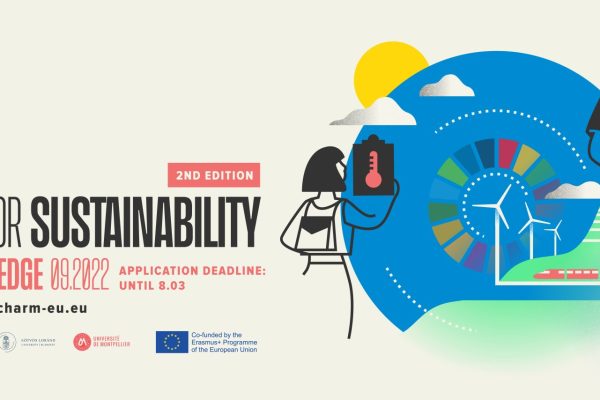On 22 February 2022, a virtual information session on the Master’s in Global Challenges for Sustainability was held. The aim of the event was to inform prospective students with information on being a CHARM-EU student and the steps to apply for the international programme. The session is now available here.

Participants had the opportunity to get to know more about the programme, teaching & learning structure, important features such as mobility and inclusiveness as well as details about the assessment method and the application process.
Jake Byrne, CHARM-EU Teacher assistant (TCD) gave an overview on the master’s innovative structure and learning experience, including career opportunities, the students’ diversity backgrounds and main features on teaching innovation. The transdisciplinary aspect of the programme has been introduced by the CHARM-EU lecturer, Sergio Villanueva (UB), who explained the concept as a ‘variety of intellectual frameworks beyond disciplinary boundaries”.
“The Master’s programme is an international, innovative, flexible, inclusive programme with a challenge-driven, research-based curriculum, enabling transdisciplinary approaches, addressing global societal challenges and skills shortages, and focusing on reconciling humanity with the planet.”
Ádám Tóth, Viktor Mihucz and Katalin Felvinczi (ELTE) explained the master’s Flexible Phase with transdisciplinary modules focusing on one of three sustainability themes: Water, Food and Life &Health. The aim of this phase is to provide students with multiple options for learning within CHARM-EU related themes. Students are required to select one theme containing multiple modules and participate in modules within that theme. The last phase of the master, the capstone, was introduced by Marjanneke Vijge, CHARM-EU Academic Coordinator (UU). She highlighted the challenge-based aspect of the thesis project and how students and (extra-)academic actors gather to collaborate on real-life sustainability challenges.
Mobility, inclusion and student-centred as key elements
Lucy Erdei, International Coordinator of the Mobility Work Package (ELTE) described how CHARM-EU mobility works, highlighting that the master’s programme, participation at phase mobility during Phase 2 is obligatory. Furthermore, she talked about embedded blended mobility programmes during Phase 2, as well as an opportunity to take part in traineeship mobility after graduation.
One of CHARM-EU’s core values is inclusiveness which is also embedded in the master’s programme. Therefore, during the session, Àgnes Sarolta Fazekas. CHARM-EU WP6 Inclusiveness Leader (ELTE) explained that, during the master’s Programme, CHARM-EU WP6 Inclusiveness Team acts as an interim CHARM-EU Diversity Equality and Inclusion Office and remains an expert group that continuously advises, supports and collaborates with relevant organisational units, various student services, and modules to safeguard that everyone is committed to creating an inclusive CHARM-EU experience.
Maria Eugenia Di Polito Perez, CHARM-EU Representative gave a glimpse ot the student experience and the benefits of being a CHARM-EU member. She highlighted the unique academic education opportunity for the curriculum and the opportunity to co-create an innovative process with Students for Students.
The information session ended with an explanation about the admissions process by Conor Spillane, CHARM-EU Project Manager (PMT) and a Q&A session. Participants learned about the access requirements, selection criteria, tuition fees and grants.
Do you still have questions about the masters? Access: https://www.charm-eu.eu/masters-global-challenges-sustainability-2022-edition
If you missed the session, don’t worry, you can watch it again at the following video: https://youtu.be/tJgC4ut8WOc